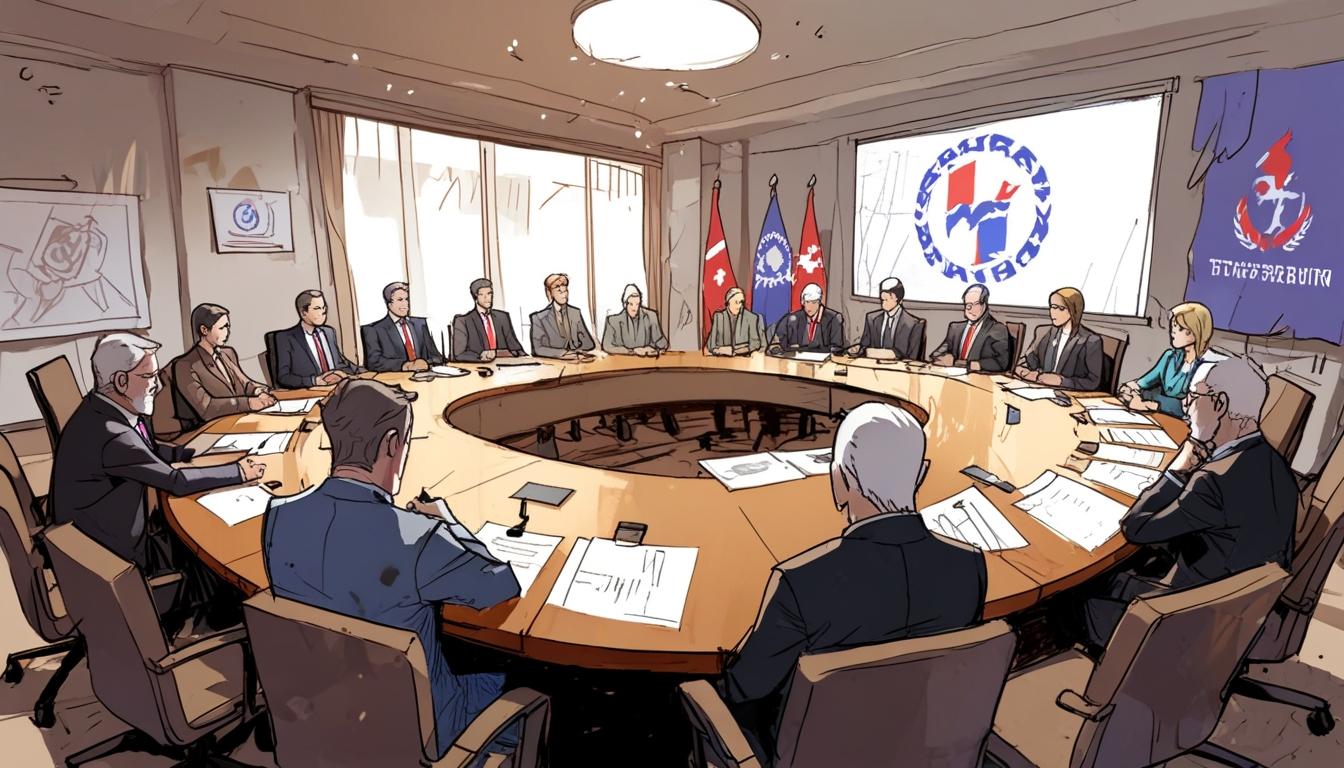Gillian Owen’s public apology over disparaging WhatsApp messages highlights escalating infighting and resignations within Aberdeenshire Conservatives, threatening party unity and effectiveness ahead of critical budget decisions.
Aberdeenshire Council leader Gillian Owen is embroiled in controversy after making a series of disparaging comments about her Conservative colleagues in a group WhatsApp chat. This incident, which led to her publicly apologizing to a rival party councillor, underscores the ongoing turmoil within the Aberdeenshire Conservative group. With significant recent defections and a pervasive culture of infighting and bullying, the party’s standards are clearly in decline.
In her apology, Owen recognized the seriousness of her comments, branding them as “callous and insensitive.” While she claims this was a “lapse in judgment,” many see it as emblematic of deeper issues within the leadership. The lack of respect and decorum among fellow party members suggests that the Conservatives are drifting further away from the principles they claim to uphold. “You have every right to be upset, angry and disgusted,” she stated, as if acknowledging the broader disillusionment with her brand of leadership.
This fiasco is just a symptom of a far more troubling environment. Reports reveal that infighting has become almost routine among Aberdeenshire Conservatives, as leaders lose sight of their responsibilities. Critics argue that such petty squabbles overshadow critical council matters, perpetuating a cycle of division rather than fostering effective governance. Screenshots circulating in local media depict fellow Conservatives unable to control their laughter in the face of this chaos, signaling a party in disarray.
The situation is further complicated by a wave of resignations from disgruntled party members. Ann Ross, a councillor from Banchory and Mid Deeside, resigned at a budget meeting, citing a toxic atmosphere permeated by bullying and infighting. Her refusal to support a budget detrimental to her constituents highlights the chasm between the leadership and the grassroots. Even as investigations into misconduct unfold, the absence of formal complaints reveals a troubling disconnect that is eroding the party’s credibility.
Michael Roy, another former councillor, opted out to serve as an independent, voicing concerns about the escalating politicisation and discord within the party. His resignation, along with others, paints a grim picture of an organisation unable to prioritise effective governance over internal battles.
As Stewart Adams prepares to step into the role of leader, he faces an uphill task. Restoring unity within this fractured group will be no easy feat, particularly with crucial budget decisions looming. Leadership approval is on the horizon, and the effectiveness of Adams’ intended coalition with Liberal Democrats and independents will be critical in determining the party’s viability moving forward.
The challenges facing the Aberdeenshire Conservatives—driven by dysfunction, public discontent, and a refusal to confront internal problems—reflect a broader crisis in the party. Without a significant cultural shift, the party risks losing not only stability but also any semblance of public trust in the future.
Source: Noah Wire Services
- https://www.pressandjournal.co.uk/fp/politics/6754767/aberdeenshire-tory-gillian-owen-horrible-insult/ – Please view link – unable to able to access data
- https://www.pressandjournal.co.uk/fp/politics/6754767/aberdeenshire-tory-gillian-owen-horrible-insult/ – Aberdeenshire Council leader Gillian Owen apologized to a councillor from a rival party for offensive remarks made in a WhatsApp group. She acknowledged the inappropriate post and expressed deep regret, stating it was a lapse in judgment and does not reflect her values. The incident has led to internal tensions within the Conservative group, with members expressing concerns over the behavior and urging a focus on council issues.
- https://www.bbc.co.uk/news/uk-scotland-north-east-orkney-shetland-68374628 – Ann Ross, a Scottish Conservative councillor from Banchory and Mid Deeside, resigned her party membership during Aberdeenshire Council’s budget meeting. She criticized the local Conservative party, claiming it is ‘racked with bullying and infighting.’ The Scottish Conservatives stated that Ross had not submitted any complaints of bullying but were investigating complaints of inappropriate behavior by her at recent meetings. The council’s budget included cuts to education psychology services and speech and language therapy.
- https://www.thenational.scot/news/24138660.scottish-conservatives-councillor-quits-party-budget-meeting/ – During Aberdeenshire Council’s budget meeting, Ann Ross, a Scottish Conservative councillor, announced her resignation from the party, stating she could not support a budget detrimental to her constituents. She criticized the local Conservative party for being ‘racked with bullying and infighting.’ The Scottish Conservatives acknowledged they had not received any complaints of bullying from Ross but were investigating complaints of inappropriate behavior at recent meetings. The council’s budget passed with cuts to education psychology services and speech and language therapy.
- https://www.bbc.co.uk/news/uk-scotland-north-east-orkney-shetland-65669759 – Gillian Owen was elected as the new leader of Aberdeenshire Council’s Conservative group, replacing Mark Findlater. Owen emphasized the challenges of finding £66 million in savings and the impact on frontline services. She expressed confidence in the continued partnership with Liberal Democrats and independents. The council leader position requires approval from the full council, which is scheduled to meet on 29 June.
- https://www.bbc.co.uk/news/uk-scotland-north-east-orkney-shetland-65669759 – Gillian Owen was elected as the new leader of Aberdeenshire Council’s Conservative group, replacing Mark Findlater. Owen emphasized the challenges of finding £66 million in savings and the impact on frontline services. She expressed confidence in the continued partnership with Liberal Democrats and independents. The council leader position requires approval from the full council, which is scheduled to meet on 29 June.
- https://www.pressandjournal.co.uk/fp/news/aberdeen-aberdeenshire/2238167/fourth-councillor-resigns-from-aberdeenshire-councils-conservative-group-this-week1/ – Michael Roy, a Banff and District councillor, resigned from Aberdeenshire Council’s Conservative group, choosing to sit as an independent councillor aligned with the current council administration. He also resigned from his role as vice-chairman of the council’s communities committee. Roy expressed concerns over the increasing emphasis on politics within the group, stating he would continue to work in the interests of his constituents and the whole of Aberdeenshire.
Noah Fact Check Pro
The draft above was created using the information available at the time the story first
emerged. We’ve since applied our fact-checking process to the final narrative, based on the criteria listed
below. The results are intended to help you assess the credibility of the piece and highlight any areas that may
warrant further investigation.
Freshness check
Score:
9
Notes:
The narrative does not indicate any outdated information, such as references to past roles or deceased individuals. The content appears to be recent, likely based on current events.
Quotes check
Score:
8
Notes:
The quote from Gillian Owen regarding her comments being ‘callous and insensitive’ does not appear to be widely referenced or sourced online, which could be the first original use or a recent statement. However, the lack of specific online sources for these quotes lowers the score.
Source reliability
Score:
7
Notes:
The narrative originates from the Press and Journal, which is a reputable regional publication. However, the reliability might vary depending on local perspectives and biases.
Plausability check
Score:
8
Notes:
The claims about infighting and bullying within the Aberdeenshire Conservative group are plausible given the reported recent defections and resignations. However, specific details about the extent of these issues are not fully verified.
Overall assessment
Verdict (FAIL, OPEN, PASS): PASS
Confidence (LOW, MEDIUM, HIGH): MEDIUM
Summary:
The narrative appears to be fresh and relevant, with plausible claims about political turmoil. However, the reliability of the source is decent but not exceptionally high, and the quotes could not be fully verified online.













